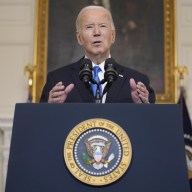 Keanu Reeves and Hiroyuki Sanada seek vengeance in “47 Ronin.”
Keanu Reeves and Hiroyuki Sanada seek vengeance in “47 Ronin.”
Credit: Frank Connor
’47 Ronin’
Director: Carl Rinsch
Stars: Keanu Reeves, Hiroyuki Sanada
Rating: PG-13
2 (out of 5) Globes
None of the previous film adaptations — nor the real-life version, for that matter — of Japan’s beloved “forty-seven ronin” story have included shape-shifting henchwomen, giant, horned rampaging beasts with eight eyes or sad Keanu. That the new “47 Ronin” includes all these plus more is not in itself a bad thing. Tales are made to be pummeled into shapes that please and entertain each era. If anything, this American-shepherded but Japan-set monstrosity ought to be more insane. Like this summer’s “The Wolverine,” it boasts a towering samurai. But the film doesn’t do anything with him other than have him stand around and show that, yes, there’s an enormous samurai dude. He’s armored up with nowhere to go.
The basic story remains roughly the same. A feudal lord assaults another lord, Kira (Tadanabu Asano); though he only grazes Kira, he is forced to commit seppuku. Disgraced and leaderless, the lord’s 47 ex-samurai — of whom we get to know about four — seek to right their master’s name and avenge his death. Added is the rampant fantasy element. Kira isn’t just evil but also has a vamping sorceress (Rinko Kikuchi) who turns into a preening fox and later a dragon. Rather than debate the merits of vengeance — which will inevitably result in their own group seppuku — our heroes wander off into muddled, under-explained adventures, including getting magic swords from a cadre of monks who look like rejects from “Babylon 5.”
The most egregious, to some, addition is Keanu Reeves, as an English-Japanese “half-breed” who worms his way into the ronin (because he wants to die?). He incurs a spate of racism from the Japanese cast; his revenge is that his presence forces everyone to speak usually belabored, stilted English. To his credit, Reeves and the Western filmmakers try their best to assimilate and adopt to the brooding, ritualistic rites of the culture and the story. This is a tale of honor, and even with fighting giants and suddenly materializing superpowers, it sticks closer to the tale — in particular its ending — than one would think from a Hollywood co-option of foreign product.
Thing is, the story actually runs on nuance, not action. The most famous film version is Kenji Mizogichi’s brilliant take from 1941, which ran two parts over four hours and spent most of its time with its characters brooding and debating what to do, as though it was populated by 47 Hamlets. (Even with gobs of time, most of its action is purposefully kept off-screen, related through ancillary characters.) This one tries to distract us with pretty images and fighting and creatures. But aside from a quiet, sneak attack leading up to a flaccid big battle, it’s all for naught.
















